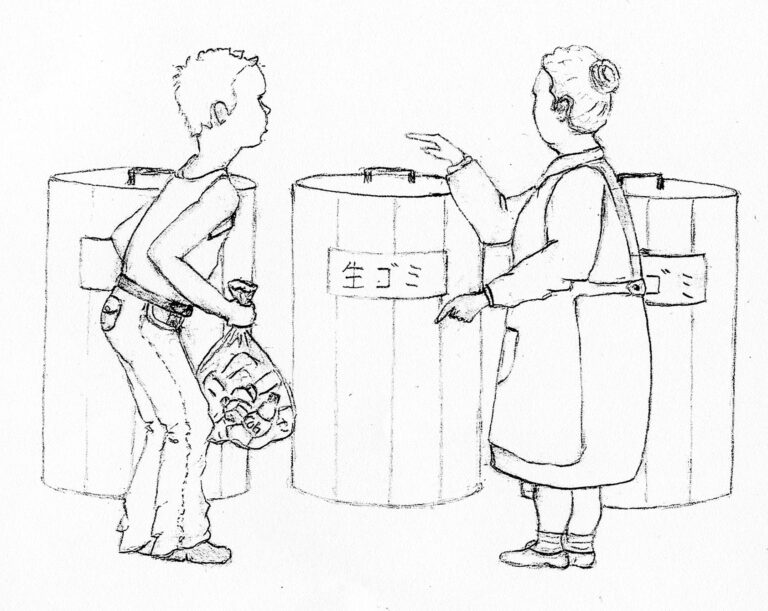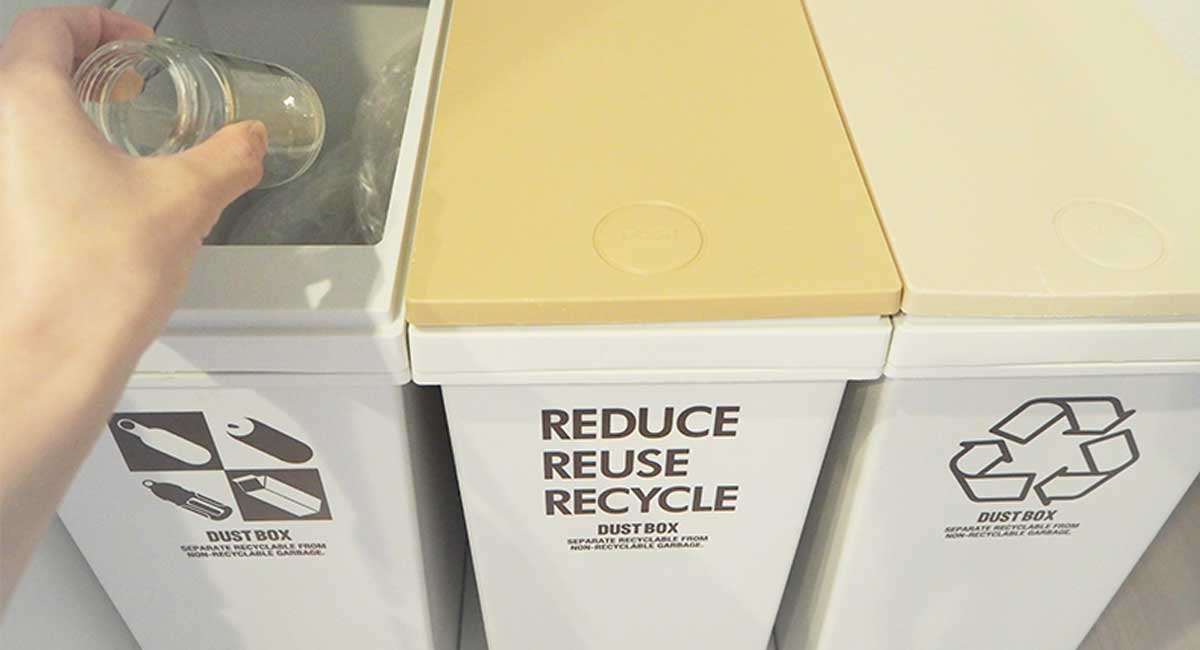若き学生時代に急遽海外放浪の旅に踏み出し、その経験から外国人賃貸業界に深い興味を抱くようになったのが、イチイ社長・荻野氏です。このコラムでは、そんな荻野の体験をコラム形式でお届けします。
※本コラムは『異文化共生住宅』をテーマにイチイ社長 荻野が2005年1月から2006年3月まで週刊住宅に寄稿したものです。
国によって違うゴミの分別 管理人は世界ゴミ分別宣教師?
住まい方のルールの中で、入居者になかなか守ってもらえないのが「ゴミの分別」だ。これが原因の近隣・地域間トラブルは多く、不動産管理会社の悩みのタネである。ただ、この「ゴミの分別」は単に近隣トラブルの問題としてではなく、いまや環境問題そして地球温暖化防止の重要なテーマとなっている。
大型ゲストハウス(160世帯、20カ国の外国人在住)のマネージャーをしている、自称「世界ゴミ分別宣教師」の川邊は“外国人のゴミ分別”について「外国人でも国によって『ゴミ分別』の意識は随分違う。ドイツ、スウェーデン、スイスなどは、社会保障制の差なのであろうか、優等生だ。アメリカ、イギリスは、入居時には『OK,OK』とニコニコ顔で返事はいいが、ぜんぜんルールを守ってくれない。
京都議定書なんて、存在そのものを知らないのではないか」と言う。また、「ゴミの分別が日本の社会の中でどういった意味を持つのかを理解させないと、彼らはなかなかルールを守らない。環境云々より、分別が近所へのルール遵守の意思表示のバロメーターになっていることが分からないと、なんでそこまで細かくやるのかが分からないようだ」とも言う。
一方、アメリカ生活が長かった外国人居住担当の宇留野は、「日本のゴミの分別、リサイクルの方法は、外国人にとって分かりにくいのでは無いか」と言う。彼が住んでいたシアトルでは、プラスチックなどは4種類くらいに細かく分別。そのためか、スーパーなどで物を買うと、商品の裏に1番、2番と番号が書いてあり、処分する時は同じ番号のゴミ容器(市から各家庭に提供)に捨てる。とても分かりやすいシステムだ。

また、ポートランドでは、スーパーなどにペットボトル、空き缶、空き瓶、古雑誌、新聞などの回収マシーンが設置されていて、リサイクル物を入れるとポイント付のレシートを受け取ることができる。買い物のついでにリサイクル、なおかつ買い物は割引してもらえる。とても便利でありがたいシステムだ。地球温暖化を阻止する「ゴミの分別」、外国人、日本人に関係なく地球の人、皆にとって分かりやすくて、便利な方法があればいい。
Different Waste Separation Practices by Country Is the Manager a Global Waste Separation Evangelist?
Among the various rules of living, one that tenants often find difficult to follow is waste separation. This issue causes numerous neighborhood and regional conflicts and is a constant headache for property management companies. However, waste separation is not merely a matter of neighborhood disputes; it has become a crucial theme for environmental issues and preventing global warming.
Kawabe, who manages a large guesthouse (with 160 households and foreign residents from 20 countries) and calls himself a “global waste separation evangelist,” says about “foreigners and waste separation,” “Even among foreigners, the awareness of ‘waste separation’ varies greatly by country. Germany, Sweden, and Switzerland are excellent in this regard, possibly due to differences in social security systems. The United States and the United Kingdom, on the other hand, respond with ‘OK, OK’ and smiles when they move in but do not follow the rules at all. They may not even be aware of the existence of the Kyoto Protocol.” He also mentions, “Unless they understand the significance of waste separation in Japanese society, they won’t adhere to the rules. More than environmental concerns, they need to realize that waste separation is a barometer of their intention to comply with neighborhood rules. Without this understanding, they don’t grasp why such meticulous separation is necessary.”
On the other hand, Uruno, who has extensive experience living in America and is responsible for foreign resident management, believes that “Japan’s waste separation and recycling methods may be difficult for foreigners to understand.” In Seattle, where he lived, plastics are divided into about four categories. When buying items in supermarkets, the back of the product has numbers like 1 and 2, and when disposing of them, you throw them into the garbage containers with the corresponding numbers provided by the city to each household. This is a very straightforward system. In Portland, supermarkets have machines for collecting PET bottles, cans, glass bottles, old magazines, and newspapers. By inserting recyclable items into these machines, you receive a receipt with points, which can be used for discounts on purchases. It’s a convenient and appreciated system that combines recycling with shopping.
Finding a way to make “waste separation,” a key to preventing global warming, easy to understand and convenient for everyone—regardless of whether they are foreigners or Japanese—would be beneficial for all residents of the Earth.
应对文化差异 各国不同的垃圾分类 管理者是世界垃圾分类的传教士?
在各类居住规则中,租户最难遵守的是“垃圾分类”。这一问题引发了许多邻里和地区间的冲突,成为房地产管理公司的头疼事。然而,“垃圾分类”不仅仅是邻里纠纷的问题,现在已经成为环境问题和防止全球变暖的重要主题。
管理着一家大型宾馆(160户家庭,住着来自20个国家的外国人)的川边自称“世界垃圾分类传教士”,他说到“外国人的垃圾分类”时表示,“即使是外国人,根据国家不同,对‘垃圾分类’的意识也有很大差异。德国、瑞典、瑞士等国家,可能由于社会保障制度的差异,是优等生。而美国、英国在入住时虽然微笑着回答‘OK,OK’,但根本不遵守规则。他们甚至可能不知道京都议定书的存在。”他还说,“如果不让他们理解垃圾分类在日本社会中的意义,他们很难遵守规则。比起环境问题,更要让他们明白,垃圾分类是对邻里守规则意愿的一个指标。如果不明白这一点,他们就不理解为什么要如此细致地分类。”
另一方面,曾长期在美国生活、负责外国人居住管理的宇留野认为,“日本的垃圾分类和回收方法对外国人来说可能不太容易理解。”他在西雅图居住时,塑料等被细分为四种左右。因此,在超市购买物品时,商品的背面会写有1号、2号等号码,处理时将其扔进市政府提供给各家庭的相应号码的垃圾容器中。这是一个非常直观的系统。另外,在波特兰,超市内设有回收PET瓶、易拉罐、玻璃瓶、旧杂志和报纸的机器,投入可回收物品后,可以收到带有积分的小票,可以在购物时享受折扣。这是一个非常方便、受欢迎的系统,将回收与购物结合在一起。
找到一种便于理解和使用的“垃圾分类”方法,不论是对外国人还是日本人来说,对于阻止全球变暖、对地球上的所有居民都是有益的。
荻野社長ブログはコチラ▶ https://co-lifestyle.net

